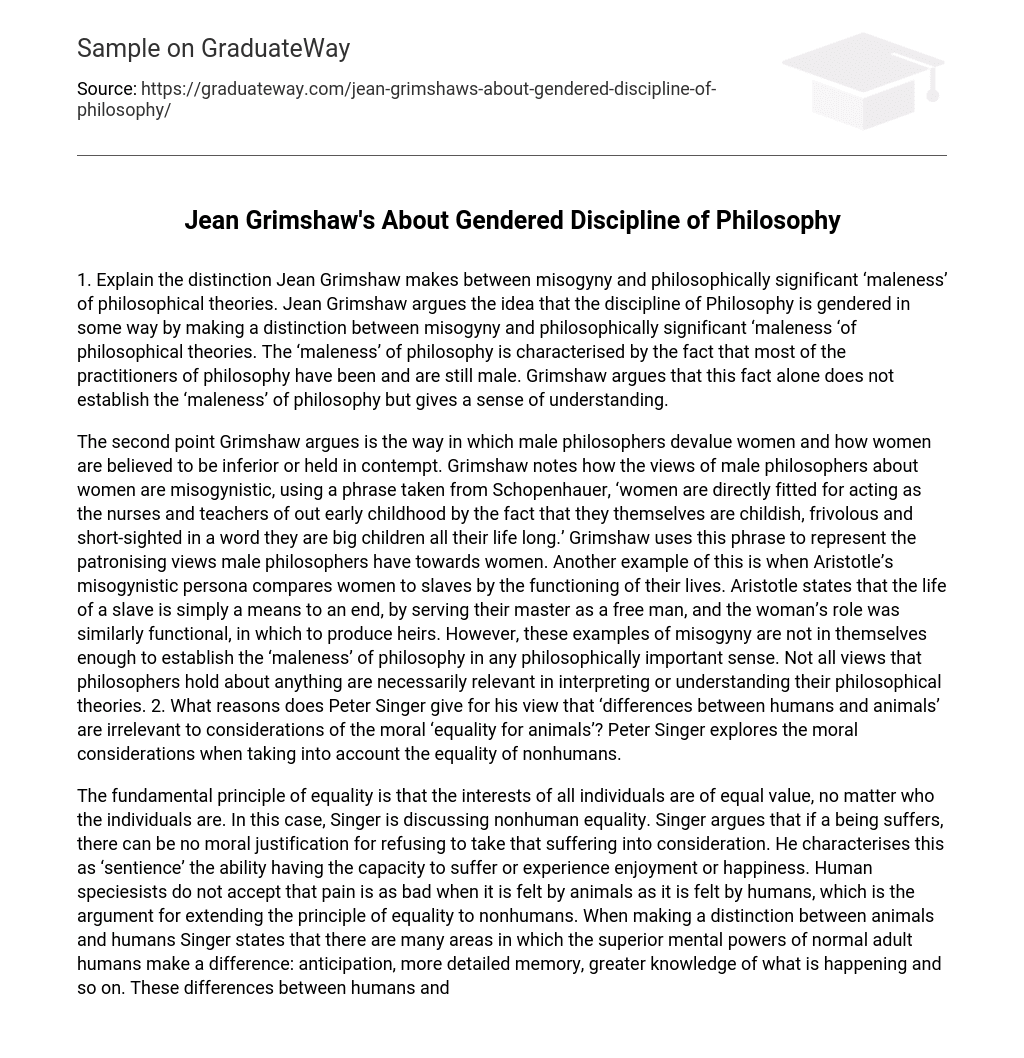1. Explain the distinction Jean Grimshaw makes between misogyny and philosophically significant ‘maleness’ of philosophical theories. Jean Grimshaw argues the idea that the discipline of Philosophy is gendered in some way by making a distinction between misogyny and philosophically significant ‘maleness ‘of philosophical theories. The ‘maleness’ of philosophy is characterised by the fact that most of the practitioners of philosophy have been and are still male. Grimshaw argues that this fact alone does not establish the ‘maleness’ of philosophy but gives a sense of understanding.
The second point Grimshaw argues is the way in which male philosophers devalue women and how women are believed to be inferior or held in contempt. Grimshaw notes how the views of male philosophers about women are misogynistic, using a phrase taken from Schopenhauer, ‘women are directly fitted for acting as the nurses and teachers of out early childhood by the fact that they themselves are childish, frivolous and short-sighted in a word they are big children all their life long.’ Grimshaw uses this phrase to represent the patronising views male philosophers have towards women. Another example of this is when Aristotle’s misogynistic persona compares women to slaves by the functioning of their lives. Aristotle states that the life of a slave is simply a means to an end, by serving their master as a free man, and the woman’s role was similarly functional, in which to produce heirs. However, these examples of misogyny are not in themselves enough to establish the ‘maleness’ of philosophy in any philosophically important sense. Not all views that philosophers hold about anything are necessarily relevant in interpreting or understanding their philosophical theories. 2. What reasons does Peter Singer give for his view that ‘differences between humans and animals’ are irrelevant to considerations of the moral ‘equality for animals’? Peter Singer explores the moral considerations when taking into account the equality of nonhumans.
The fundamental principle of equality is that the interests of all individuals are of equal value, no matter who the individuals are. In this case, Singer is discussing nonhuman equality. Singer argues that if a being suffers, there can be no moral justification for refusing to take that suffering into consideration. He characterises this as ‘sentience’ the ability having the capacity to suffer or experience enjoyment or happiness. Human speciesists do not accept that pain is as bad when it is felt by animals as it is felt by humans, which is the argument for extending the principle of equality to nonhumans. When making a distinction between animals and humans Singer states that there are many areas in which the superior mental powers of normal adult humans make a difference: anticipation, more detailed memory, greater knowledge of what is happening and so on. These differences between humans and animals lead to the conclusion that normal adult human beings have mental capacities which will, in certain circumstances lead them to suffer more than animals would in the same circumstances. However, Singer proposes that if we use this argument to justify experiments on nonhuman animals then we have to ask ourselves whether we are also prepared to allow experiments on human infants and retarded adults as they too would have no idea of what was going to happen to them. In conclusion, Singer argues that the difference between humans and animals should not be considered when defining the moral standards of animal equality, as the fundamental principle of equality supersedes differences in species, regardless of mental capacity.
3. What is the key point of Mark Sagoff’s argument in ‘Animal Liberation and Environmental Ethics: Bad marriage, Quick Divorce’? What are the main ideas he uses to support this point? Mark Sagoff explores the idea of animal and environmental ethics. His key point to his argument is that animal activists cannot be environmentalists. Animal activists believe that animals have rights equal to human beings. Sagoff suggests that nature is more detrimental than humanity. Nature undermines the rights of animals by killing them in far greater numbers than humans. ‘Few organisms survive to reach sexual maturity most are quickly annihilated in the struggle for existence’, nature limits animal populations by killing every individual before maturity. Nature comes to animals with suffering that exceeds animal suffering at the hands of humans: predation, starvation, disease, cold, parasitism, etc. Sagoff argues that to protect the rights and interests of animals, animal activists should be taking animals out of the wild and placed into more humane environments such as; wilderness areas, national parks, farms. Animal activists should be trying to prevent predation, however such a proposal is anti-environmentalist.it sacrifices the authenticity, integrity and wildness of ecosystems. Therefore, animal activists cannot consistently be environmentalists, and vice-versa.
There are significant differences between animal activists and environmentalists. Animal activists are concerned with animal equality and animal rights, whereas environmentalists care for ecological integrity. Animal activists have humanitarian ethics of concern for animal suffering and death, while environmentalists have ecological and environmental ethics which respect and admire the functioning of natural systems. Predation is seen as a negative thing as it opposes predator restoration by animal activists, whilst predation is perceived as a good way to reintroduce predators in the wild. Environmentalists and animal activists cannot consistently cooperatively work as they contradict each other’s values. 4. R.G Swinburne claims that the rejection of the ‘argument from design’ for God’s existence, on the basis of acceptance of the laws of evolution, was premature. What reasons does he give for this view?
References
Jean Grimshaw, ‘The Maleness of Philosophy’, in Philosophy and Feminist Thinking (Minneapolis: University of Minnesota Press, 1986) pp. 36-52 Mark Sagoff, ‘Animal Liberation and Environmental Ethics: Bad Marriage, Quick Divorce’, in Environmental Philosophy, edited by Michael E. Zimmerman, et al. Englewood Cliffs: Prentice-Hall, 1993, pp. 84-94 Peter Singer, ‘Practical Ethics’ (Cambridge: Cambridge University Press, 1979) pp. 48-71 R.G. Swinburne, ‘Arguments for the Existence of God’, in Key Themes in Philosophy, edited by A. Phillips Griffiths. Cambridge: Cambridge University Press, 1989, pp. 121-133





